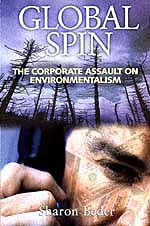|
|
|
Cooperation Or Submersion In NZ we have recently seen WWF (NZ) suddenly backing up Shell in the face of criticism about a PR story which claimed that Shell had saved and Antarctic whale from extinction. Turns out that they had paid for some research into the whale's habits; something of a far cry from 'saving' it. But the spokesman for WWF, who had viewed the advert beforehand, could see nothing wrong with this claim. While Greenpeace and FoE might have more of a spine, there will be intense pressure on them, both internally and externally, once they are dependent on the kick backs. There are benefits of being on the inside, but FoE mentions in this article that it has already seen misuse of its connection with them. Note also the recent articles we've seen on co-opting the more 'reasonable' groups, in order to shut out the others. GP and FoE may be let into the discussion, but find that other voices are rejected, with the line that 'we have representatives of those views already' and they may even be put in the position where they have to criticise the views of the 'less reasonable'. This co-opting is a long known strategy of the environmental PR campaigns, documented in "Toxic Sludge is good for you", "Global Spin" and other books on the PR industry.
Greenpeace gets in bed with its
foes The Independent (UK), October 15, 2000, GREENPEACE has struck a controversial alliance with the marketing services group run by Lord Bell, adviser to Monsanto, British Nuclear Fuels (BNFL) and General Pinochet, among others. In the ground-breaking deal, the environmental lobby group is receiving free advertising and marketing from HHCL, the advertising arm of Lord Bell's Chime Communications. In exchange it will give free environmental audits to HHCL's clients, which include Texaco, Tango and Egg. But the deal may go further. Rupert Howell, founder of HHCL and chief executive of Chime, said he was talking to Greenpeace's UK boss, Lord Melchett, about extending the relationship to other parts of Chime. These include Bell Pottinger, which works for two leading targets of environmentalists - GM crops maker Monsanto and BNFL, the nuclear reprocessing group. "Greenpeace said they would be fascinated to give advice to Monsanto," said Mr Howell. John Sauven, campaigns director of Greenpeace, confirmed it would be willing to do business with Monsanto, and revealed that the two arch enemies had already struck one deal, when a Monsanto subsidiary made a biodegradable credit card for Greenpeace. He denied Greenpeace was being used to legitimise companies that were only paying lip service to green issues. "We worked with BP but still felt free to criticise its exploration for oil in the Arctic." The thawing of relations between green lobby groups and industry is even reaching Friends of the Earth. It is in talks with the international advertising group D'Arcy, which works for Mars and Laura Ashley among others, about a similar deal. "We've been happy to do it because we've been able to challenge the companies, and the creative people in particular, over the extent to which they are shapers of public opinion rather than reflectors," said Tony Juniper, policy and campaigns director of Friends of the Earth. "The advertising agency is a very strong force in promoting the throw-away consumer society which is at the heart of our environmental problems." But Mr Juniper warned of the risk of environmentalists being used to legitimise big business practices. One company lauded by Friends of the Earth for having a relatively good record on hardwood timber had tried to capitalise on the endorsement misleadingly. However, he added: "The things we are trying to do are hard enough without cutting out the opportunities to create change in places where we think it can happen. Greenpeace is a grown-up organisation that will use this relationship to advance its agenda. "But for a company like Texaco, the challenge is not so much talking about giving renewable oil cans or the company recycling, but to get out of fossil fuels which is its core business. That's the scale of the challenge they have to face up to and they are not going to face up to it by giving themselves a gloss by aligning themselves with green organisations."ry. ...
|

